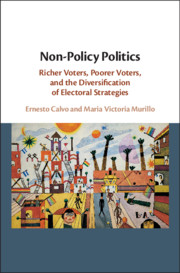Book contents
- Non-Policy Politics
- Non-Policy Politics
- Copyright page
- Dedication
- Contents
- Figures
- Tables
- Prologue
- 1 Non-Policy Politics
- 2 A Demand-Side Model of Non-Policy Politics
- 3 Tracing Political Preferences and Party Organization in Argentina and Chile
- 4 Mapping Voter Preferences in Argentina and Chile
- 5 Party Organization
- 6 Voters’ Preferences and Parties’ Electoral Offers
- 7 Party Activists and Their Conditional Effect on the Vote
- 8 Targeting Patronage in Argentina and Chile
- 9 Back to Policy Offers
- 10 Non-Policy Politics and Electoral Responsiveness
- Appendices
- Appendix with List of Cited Politicians
- References
- Index
10 - Non-Policy Politics and Electoral Responsiveness
Published online by Cambridge University Press: 25 January 2019
- Non-Policy Politics
- Non-Policy Politics
- Copyright page
- Dedication
- Contents
- Figures
- Tables
- Prologue
- 1 Non-Policy Politics
- 2 A Demand-Side Model of Non-Policy Politics
- 3 Tracing Political Preferences and Party Organization in Argentina and Chile
- 4 Mapping Voter Preferences in Argentina and Chile
- 5 Party Organization
- 6 Voters’ Preferences and Parties’ Electoral Offers
- 7 Party Activists and Their Conditional Effect on the Vote
- 8 Targeting Patronage in Argentina and Chile
- 9 Back to Policy Offers
- 10 Non-Policy Politics and Electoral Responsiveness
- Appendices
- Appendix with List of Cited Politicians
- References
- Index
Summary
- Type
- Chapter
- Information
- Non-Policy PoliticsRicher Voters, Poorer Voters, and the Diversification of Electoral Strategies, pp. 214 - 228Publisher: Cambridge University PressPrint publication year: 2019



